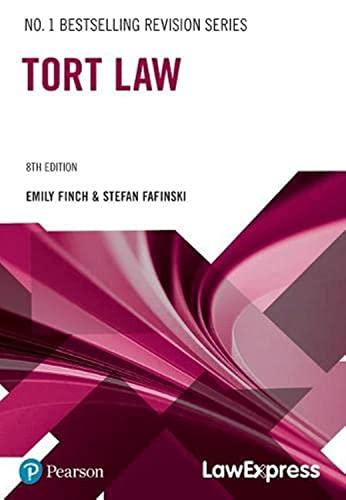Question
1.According to utilitarianism, the morally right act is the one that ... a) contributes to my own happiness. b) maximizes my own happiness. c) contributes
1.According to utilitarianism, the morally right act is the one that ...
a) contributes to my own happiness.
b) maximizes my own happiness.
c) contributes to the total amount of happiness across all those affected by the act.
d) maximizes the total amount of happiness across all those affected by the act.
e) minimizes the total amount of happiness across all those affected by the act.
2.One key difference between Bentham's and Mill's respective versions of utilitarianism is that ...
a) Bentham draws a distinction between higher and lower pleasures while Mill does not.
b) Mill believes that the principle of utility applies both to the actions of individuals and government policies while Bentham believes that it applies only to the actions of individuals.
c) Bentham believes that the principle of utility applies both to the actions of individuals and government policies while Mill believes that it applies only to the actions of individuals.
d) Mill draws a distinction between higher and lower pleasures while Bentham does not.
e) Bentham but not Mill believes that morality requires the maximization of aggregate happiness.
unanswered.
3.According to Bentham, ...
a) every person has a natural right to life, liberty, and property.
b) every person has an unalienable natural right to life, liberty, and property.
c) the idea of natural rights is essential to understanding the idea of social justice and moral rightness.
d) the idea of natural rights does not make sense.
e) the idea of natural rights is central to utilitarianism.
4.According to Mill, ...
a) individuals have natural rights.
b) the ideas of justice and individual rights are central to common sense morality and utilitarianism can account for that status.
c) utilitarianism is a doctrine for swine.
d) the idea of maximized aggregate happiness is incoherent.
e) all pleasures are qualitatively equal.
5.In ancient Rome, Christians were fed to the lions in a public spectacle intended to entertain the masses. Which of the following sounds most like something that Mill might say about this situation?
a) Since all pleasures are of the same quality, all that matters, morally speaking, is the quantity of pleasure that the crowd derives from the spectacle minus the quantity of pain experienced by the Christians who are being fed to the lions.
b) The principle of utility is a good theory in most situations. But in extreme situations like this, we need to do what is moral rather than what the principle of utility tells us to do. For this reason, it is wrong to feed the Christians to the lions.
c) Some pleasures, because they are of a low quality, do not deserve to be given equal weight or priority when deciding what to do. The pleasure obtained from watching someone being fed to a lion is likely to be one such pleasure. So the pain suffered by the Christians should factor into my deliberations more heavily than the pleasure enjoyed by the spectators.
d) b and c.
e) a and c.
Step by Step Solution
There are 3 Steps involved in it
Step: 1

Get Instant Access to Expert-Tailored Solutions
See step-by-step solutions with expert insights and AI powered tools for academic success
Step: 2

Step: 3

Ace Your Homework with AI
Get the answers you need in no time with our AI-driven, step-by-step assistance
Get Started


